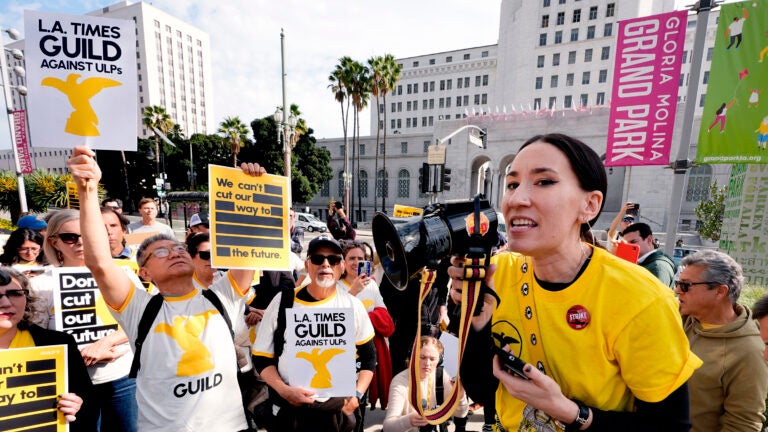 “The situation at the Los Angeles Times can be viewed as part of a broader pattern of labor organizing and strikes over the past couple of years, as workers and employers struggle over what the post-pandemic economy will look like. But it also stands apart, because it makes clear the connection between workers having a say on the job, and voters having accurate information they trust in an election year,” said Christian Phillips, assistant professor of political science at the USC Dornsife College of Letters, Arts and Sciences.
“The situation at the Los Angeles Times can be viewed as part of a broader pattern of labor organizing and strikes over the past couple of years, as workers and employers struggle over what the post-pandemic economy will look like. But it also stands apart, because it makes clear the connection between workers having a say on the job, and voters having accurate information they trust in an election year,” said Christian Phillips, assistant professor of political science at the USC Dornsife College of Letters, Arts and Sciences.
“Cuts to news staffing levels in media markets across the country will mean that voters will have fewer options for local, high quality journalism they have confidence in. In a period voters are already having doubts about where to go for trustworthy information, that is troubling.”
Contact: christian.d.phillips@usc.edu
Outlets compete to become California’s ‘paper of record’
 “The Los Angeles Times leadership has never responded to the question of ‘what is your identity.’ I don’t see how the answer can be anything other than ‘We are the California paper of record.’ You need to own your lane in this business,” said Gabriel Kahn, professor of professional practice of journalism at the USC Annenberg School for Communication and Journalism.
“The Los Angeles Times leadership has never responded to the question of ‘what is your identity.’ I don’t see how the answer can be anything other than ‘We are the California paper of record.’ You need to own your lane in this business,” said Gabriel Kahn, professor of professional practice of journalism at the USC Annenberg School for Communication and Journalism.
“As the LA Times in recent years has failed to stake a claim to California, others, like CalMatters and Politico, have come in to pick up the slack. That leaves less space for the Times to operate, which is a lost opportunity.”
Contact: gabriel.kahn@usc.edu
Social media algorithms that personalize news, feed users biased content
 “Despite the introduction of some fact-checking systems on select social media platforms, there is still insufficient regulation of fake news. Recent studies also highlight the growing perception of ‘news finds me,’ where individuals rely on the social media algorithms to deliver all the relevant news they need,” said Kristen Schiele, associate professor of clinical marketing at the USC Marshall School of Business.
“Despite the introduction of some fact-checking systems on select social media platforms, there is still insufficient regulation of fake news. Recent studies also highlight the growing perception of ‘news finds me,’ where individuals rely on the social media algorithms to deliver all the relevant news they need,” said Kristen Schiele, associate professor of clinical marketing at the USC Marshall School of Business.
Article bias may also extend to the choice of social media platforms individuals choose as their source of news, said Schiele. Age, gender and other demographics influence users’ preferred platforms. For example, adults tend to favor Facebook as a news source, while TikTok has emerged as the fastest-growing news platform for younger audiences. Each platform utilizes unique algorithms and may present news in different ways, she said.
“There is a growing concern about the potential polarizing impact this may have on different generations and their perspectives on news, particularly regarding social and political issues. This becomes significantly important in an election year, where the spread of fake news and biased, misleading content poses challenges that need to be addressed.”
Contact: kschiele@marshall.usc.edu
New York Times’ lawsuit against OpenAI, Microsoft may be a landmark
 “The computational models AI systems use to generate text and images are trained on massive amounts of existing material, often without the permission of the original creators. But do AI companies even need permission to do this? The recent lawsuit filed by The New York Times against OpenAI and Microsoft aims to answer this question, at least in part,” said Jeffrey Pearlman, a clinical associate professor of law and director of the Intellectual Property & Technology Law Clinic at the USC Gould School of Law.
“The computational models AI systems use to generate text and images are trained on massive amounts of existing material, often without the permission of the original creators. But do AI companies even need permission to do this? The recent lawsuit filed by The New York Times against OpenAI and Microsoft aims to answer this question, at least in part,” said Jeffrey Pearlman, a clinical associate professor of law and director of the Intellectual Property & Technology Law Clinic at the USC Gould School of Law.
“The situation is complex. The Times alleges that the AI will regurgitate large portions of their articles on demand. But without discovery, the details of how OpenAI trains its models are unclear, as are the details of how the Times conducted the testing at the heart of its lawsuit. Some of the articles at issue have been reproduced by other websites, and may not have come from the Times. Some of the training data is collected by third parties outside the control of OpenAI.
“The behavior and capabilities of OpenAI’s models are constantly being updated, and there is an array of parallel lawsuits aimed at this and other aspects of generative AI, which may come to conflicting conclusions. But given the proliferation of generative AI and the challenges already faced by modern journalism, this lawsuit is surely one of the most important to watch.”
Contact: jef@law.usc.edu
‘Academic Twitter is dead, and that sucks’
 “What was once a vibrant—if chaotic—place is now a ghost town population mostly with bots and bigots,” wrote Morgan Polikoff, associate professor of education at the USC Rossier School of Education, in a recent blog post.
“What was once a vibrant—if chaotic—place is now a ghost town population mostly with bots and bigots,” wrote Morgan Polikoff, associate professor of education at the USC Rossier School of Education, in a recent blog post.
“Education policy is a fast-moving field; at any given time there are policies being enacted in 13,000 school districts, 50 states, and the federal government, and Twitter kept me connected to what was happening on the ground in ways that would otherwise have been impossible.”
“And now it’s all gone. There’s almost nothing useful left on Twitter. Academics are trying to recreate the magic on Bluesky or Mastodon, but I think there will never be another Twitter. Without the special mix of Twitter—the diversity of its users and the spiciness of the engagement—a roomful of academics alone just isn’t going to cut it. And that is a loss—not just for me personally, but for the idea that academics who care about public impact can reach a broad audience directly.”
Contact: polikoff@usc.edu
Additional Experts
Mike Murphy is an expert on the intersection of media and politics, and the role of campaign ad buys on outlets during election season. Murphy, one of the Republican party’s most successful media strategists, co-directs the USC Dornsife Center for the Political Future.
Contact: cpf@usc.edu or kplaza@usc.edu
###
Karen North is a recognized expert in the field of digital and social media, with interests spanning personal and corporate brand building, digital election meddling, reputation management, and more. North is a clinical professor of communication at USC Annenberg.
Contact: knorth@usc.edu
###




